Unit 1 Playing Sports 一般将来时课件(共22张PPT)
文档属性
| 名称 | Unit 1 Playing Sports 一般将来时课件(共22张PPT) | 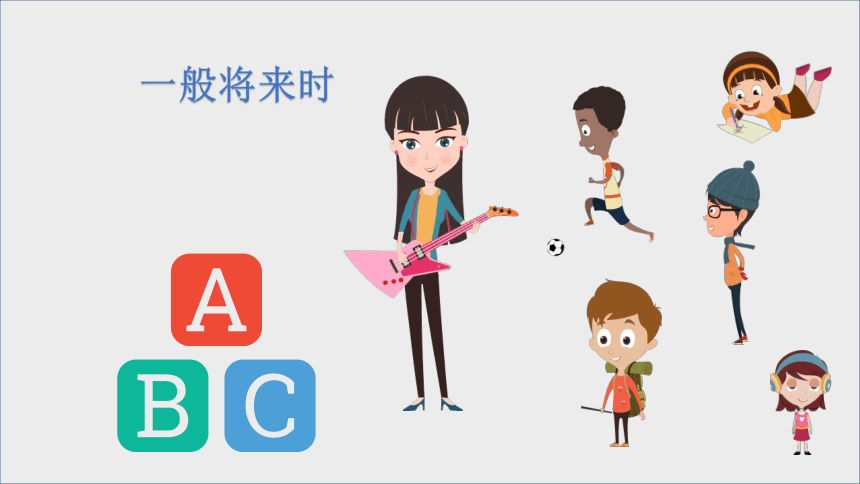 | |
| 格式 | pptx | ||
| 文件大小 | 438.3KB | ||
| 资源类型 | 教案 | ||
| 版本资源 | 仁爱科普版 | ||
| 科目 | 英语 | ||
| 更新时间 | 2023-09-07 16:12:21 | ||
图片预览

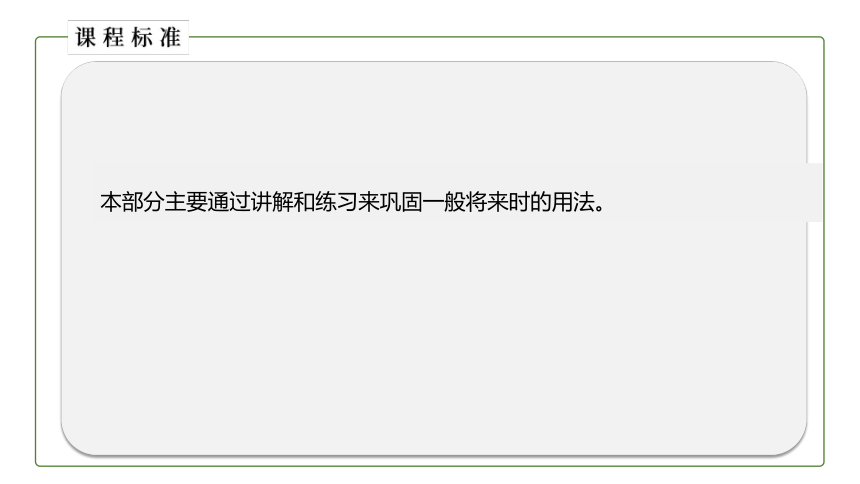
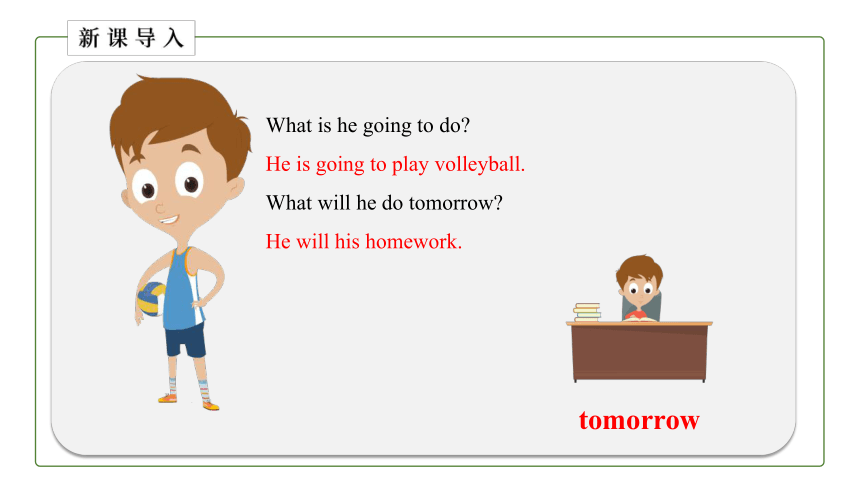
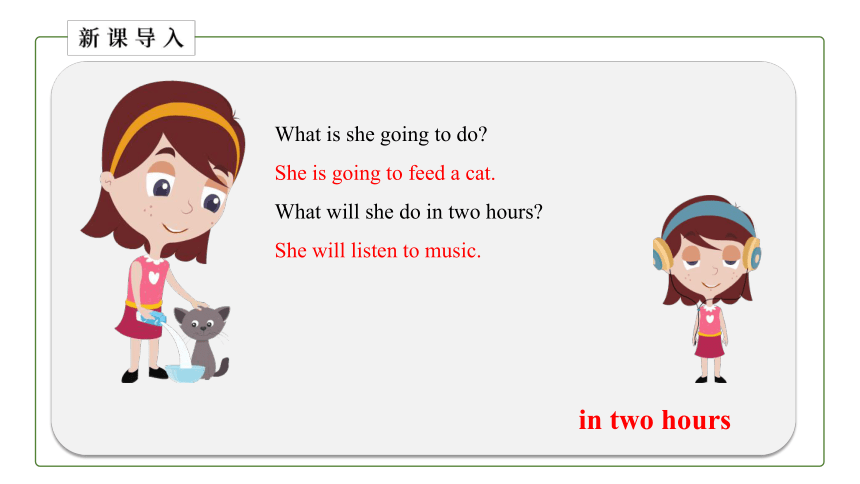
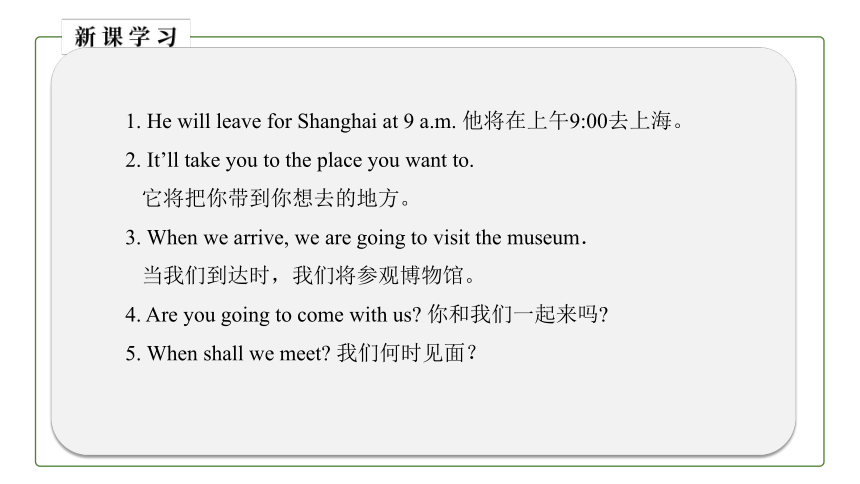
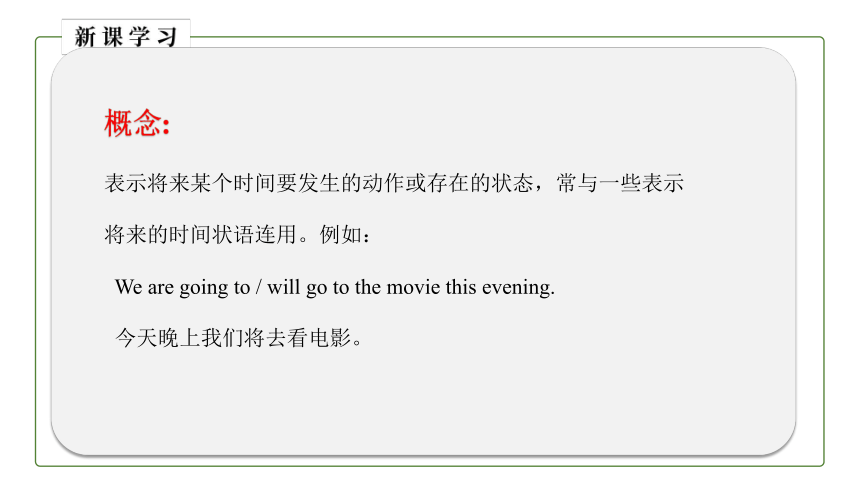
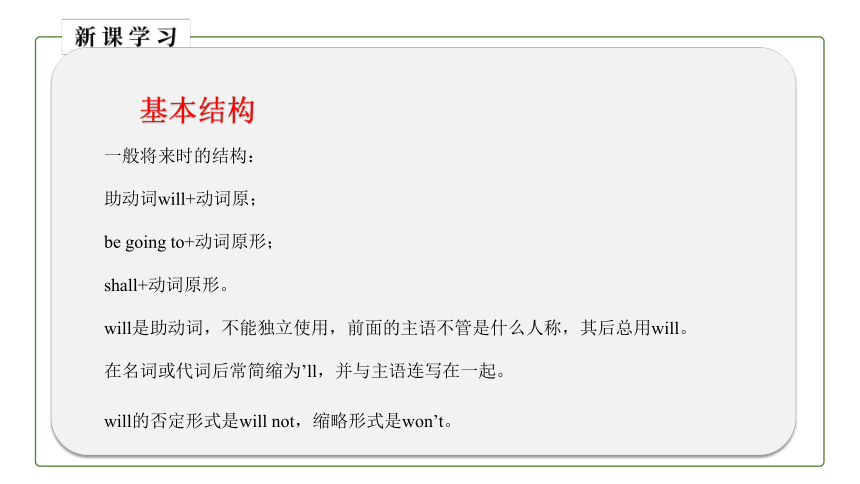
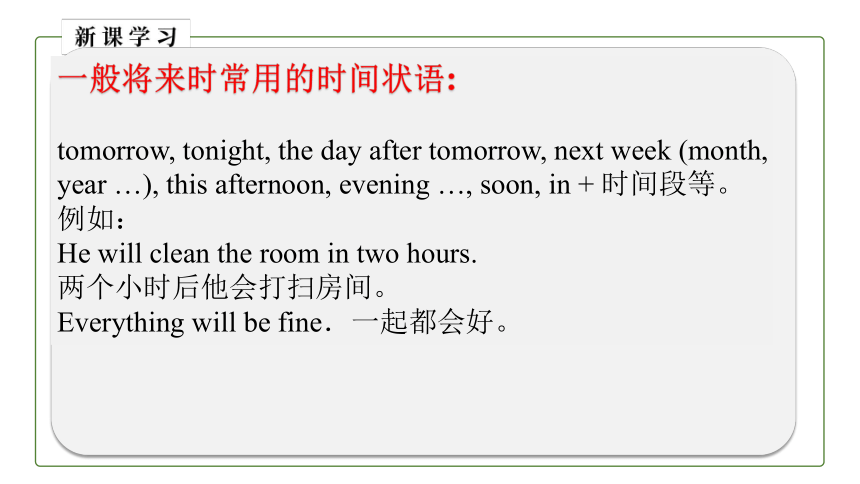
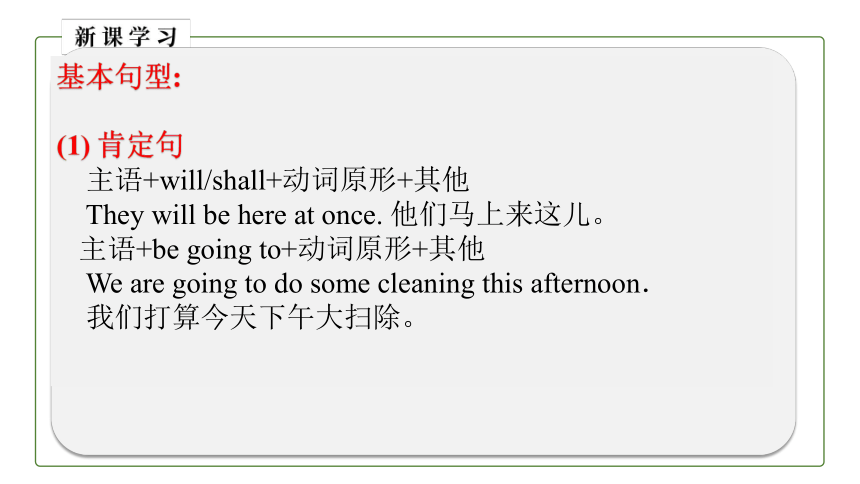
文档简介
(共22张PPT)
一般将来时
本部分主要通过讲解和练习来巩固一般将来时的用法。
What is he going to do
He is going to play volleyball.
What will he do tomorrow
He will his homework.
tomorrow
What is she going to do
She is going to feed a cat.
What will she do in two hours
She will listen to music.
in two hours
1. He will leave for Shanghai at 9 a.m. 他将在上午9:00去上海。
2. It’ll take you to the place you want to.
它将把你带到你想去的地方。
3. When we arrive, we are going to visit the museum.
当我们到达时,我们将参观博物馆。
4. Are you going to come with us 你和我们一起来吗
5. When shall we meet 我们何时见面?
概念:
表示将来某个时间要发生的动作或存在的状态,常与一些表示
将来的时间状语连用。例如:
We are going to / will go to the movie this evening.
今天晚上我们将去看电影。
基本结构
一般将来时的结构:
助动词will+动词原;
be going to+动词原形;
shall+动词原形。
will是助动词,不能独立使用,前面的主语不管是什么人称,其后总用will。
在名词或代词后常简缩为’ll,并与主语连写在一起。
will的否定形式是will not,缩略形式是won’t。
一般将来时常用的时间状语:
tomorrow, tonight, the day after tomorrow, next week (month, year …), this afternoon, evening …, soon, in + 时间段等。
例如:
He will clean the room in two hours.
两个小时后他会打扫房间。
Everything will be fine.一起都会好。
基本句型:
(1) 肯定句
主语+will/shall+动词原形+其他
They will be here at once. 他们马上来这儿。
主语+be going to+动词原形+其他
We are going to do some cleaning this afternoon.
我们打算今天下午大扫除。
(2) 否定句
1) 主语+ will + not + 动词原形+其他
He will not be late next time. 他下次不会迟到。
2) 主语+be + not + going to+动词原形+其他
He isn’t going to do shopping tomorrow.
明天他不去购物。
(3) 一般疑问句
1) Will+主语+动词原形+其他
Will you give him a hand 你会帮助他吗
2) Be动词(Am, Is, Are)+主语+going to+动词原形+其他
Are you going to watch TV tomorrow
你打算明天下午看电视吗
(4) 特殊疑问句
疑问词+一般疑问句
—What will you do after school 放学后你做什么?
—I will water the flowers. 我会浇花。
易错点:
(1)主语是第一人称I, we 时,常用助动词 shall + 动词原形。
例如:Where shall we meet tomorrow 明天在哪里见面?
(2)在问对方是否愿意或表示客气的邀请时,常用 will。例如:
Will you go shopping with me 你愿意和我去购物吗?
Will you please turn down the radio 请把收音机声音调小好吗?
(3)在表示建议或征求对方意见时,用 shall。例如:
Shall we meet at ten 我们在10:00见面好吗?
There be句型的一般将来时
(1)There be句型与含有will的一般将来时基本结构:
There will be +名词+其他成分
例如:
There will be a meeting this afternoon. 今天下午有个会议。
(2)There be句型与含有be going to的一般将来时基本结构:
There is / are going to be +名词+其他成分(注意句型中going to 后面的be不能改为have。) 常用来表示将有某事发生。例如:
There is going to be a school sports next week in our school.
下周我们学校将举行运动会。
be going to与will 的区别:
1)be going to 表示近期、眼下就要发生的事情,will 表示的将来时间则较远一些。例如:
He is going to do his homework tonight. 今晚他打算写作业。
He will be a musician one day. 有一天他会成为音乐家。
2)be going to 表示根据主观判断将来肯定发生的事情,will表示客观上将来势必发生的事情。例如:
I think our team is going to win the game. 我认为我们队会赢得比赛。
He will be twenty years old next year. 明年他就20岁了。
3)be going to含有“计划,准备”的意思,而will则没有这个意思。例如:
I’m going to play football with my friend. 我打算和朋友踢球。
He will be here in an hour. 他一小时后到达这里。
be going to与will 的区别:
4)在有条件从句的主句中,一般不用 be going to, 而多用will。例如:
We’ll go hiking if the weather is fine. 如果天气好,我们会去远足。
5)be going to 表示根据目前迹象推断将要发生的事情,而在没有迹象表明的情况下进行
的猜测用“will”和“ be going to”皆可。例如:
Look at the clouds. It’s going to rain. 你看天上的云。快下雨了。
I think the weather will be nice.
I think the weather is going to be nice.
1. 我打算明天和朋友去野炊。
I ________ _______ _________ have a picnic with my friends.
2. 下个星期一你打算去干什么 我想去打篮球。
What ________ ________ _________ _________ _________ next Monday
I _______ ________ _______ play basketball.
3. 如果天气好,我们明天去钓鱼。
If it _______ fine tomorrow, we _______ go fishing.
am going to
are you going to do
am going to
is will
4. 你妈妈这个周末去购物吗?是,她要去买一些水果。
________ your mother _______ ________ go shopping this weekend
Yes, she _________. She ______ ________ __________ buy some fruits.
5. 你们打算什么时候见面。
What time _______ you _________ __________ meet
Is going to
is
is going to
are going to
句式转换,每空一词。
1. Nancy is going to go camping.(改为否定句)
Nancy ________ going to go camping.
2. I’ll go and join them.(改为否定句)
I _______ go ______ join them.
3. I’m going to get up at 6:30 tomorrow.(改为一般疑问句)
________ _______ ________ to get up at 6:30 tomorrow
isn’t
won’t
to
Are you going
4. We will meet at the bus stop at 10:30.(改为一般疑问句)
_______ ________ meet at the bus stop at 10:30
5. She is going to listen to music after school.(对划线部分提问)
________ _______ she ________ ________ _________ after school
Will you
What is going to do
Summary:
We learn:
一般将来时的概念、结构和用法
Homework:
Do more exercises.
一般将来时
本部分主要通过讲解和练习来巩固一般将来时的用法。
What is he going to do
He is going to play volleyball.
What will he do tomorrow
He will his homework.
tomorrow
What is she going to do
She is going to feed a cat.
What will she do in two hours
She will listen to music.
in two hours
1. He will leave for Shanghai at 9 a.m. 他将在上午9:00去上海。
2. It’ll take you to the place you want to.
它将把你带到你想去的地方。
3. When we arrive, we are going to visit the museum.
当我们到达时,我们将参观博物馆。
4. Are you going to come with us 你和我们一起来吗
5. When shall we meet 我们何时见面?
概念:
表示将来某个时间要发生的动作或存在的状态,常与一些表示
将来的时间状语连用。例如:
We are going to / will go to the movie this evening.
今天晚上我们将去看电影。
基本结构
一般将来时的结构:
助动词will+动词原;
be going to+动词原形;
shall+动词原形。
will是助动词,不能独立使用,前面的主语不管是什么人称,其后总用will。
在名词或代词后常简缩为’ll,并与主语连写在一起。
will的否定形式是will not,缩略形式是won’t。
一般将来时常用的时间状语:
tomorrow, tonight, the day after tomorrow, next week (month, year …), this afternoon, evening …, soon, in + 时间段等。
例如:
He will clean the room in two hours.
两个小时后他会打扫房间。
Everything will be fine.一起都会好。
基本句型:
(1) 肯定句
主语+will/shall+动词原形+其他
They will be here at once. 他们马上来这儿。
主语+be going to+动词原形+其他
We are going to do some cleaning this afternoon.
我们打算今天下午大扫除。
(2) 否定句
1) 主语+ will + not + 动词原形+其他
He will not be late next time. 他下次不会迟到。
2) 主语+be + not + going to+动词原形+其他
He isn’t going to do shopping tomorrow.
明天他不去购物。
(3) 一般疑问句
1) Will+主语+动词原形+其他
Will you give him a hand 你会帮助他吗
2) Be动词(Am, Is, Are)+主语+going to+动词原形+其他
Are you going to watch TV tomorrow
你打算明天下午看电视吗
(4) 特殊疑问句
疑问词+一般疑问句
—What will you do after school 放学后你做什么?
—I will water the flowers. 我会浇花。
易错点:
(1)主语是第一人称I, we 时,常用助动词 shall + 动词原形。
例如:Where shall we meet tomorrow 明天在哪里见面?
(2)在问对方是否愿意或表示客气的邀请时,常用 will。例如:
Will you go shopping with me 你愿意和我去购物吗?
Will you please turn down the radio 请把收音机声音调小好吗?
(3)在表示建议或征求对方意见时,用 shall。例如:
Shall we meet at ten 我们在10:00见面好吗?
There be句型的一般将来时
(1)There be句型与含有will的一般将来时基本结构:
There will be +名词+其他成分
例如:
There will be a meeting this afternoon. 今天下午有个会议。
(2)There be句型与含有be going to的一般将来时基本结构:
There is / are going to be +名词+其他成分(注意句型中going to 后面的be不能改为have。) 常用来表示将有某事发生。例如:
There is going to be a school sports next week in our school.
下周我们学校将举行运动会。
be going to与will 的区别:
1)be going to 表示近期、眼下就要发生的事情,will 表示的将来时间则较远一些。例如:
He is going to do his homework tonight. 今晚他打算写作业。
He will be a musician one day. 有一天他会成为音乐家。
2)be going to 表示根据主观判断将来肯定发生的事情,will表示客观上将来势必发生的事情。例如:
I think our team is going to win the game. 我认为我们队会赢得比赛。
He will be twenty years old next year. 明年他就20岁了。
3)be going to含有“计划,准备”的意思,而will则没有这个意思。例如:
I’m going to play football with my friend. 我打算和朋友踢球。
He will be here in an hour. 他一小时后到达这里。
be going to与will 的区别:
4)在有条件从句的主句中,一般不用 be going to, 而多用will。例如:
We’ll go hiking if the weather is fine. 如果天气好,我们会去远足。
5)be going to 表示根据目前迹象推断将要发生的事情,而在没有迹象表明的情况下进行
的猜测用“will”和“ be going to”皆可。例如:
Look at the clouds. It’s going to rain. 你看天上的云。快下雨了。
I think the weather will be nice.
I think the weather is going to be nice.
1. 我打算明天和朋友去野炊。
I ________ _______ _________ have a picnic with my friends.
2. 下个星期一你打算去干什么 我想去打篮球。
What ________ ________ _________ _________ _________ next Monday
I _______ ________ _______ play basketball.
3. 如果天气好,我们明天去钓鱼。
If it _______ fine tomorrow, we _______ go fishing.
am going to
are you going to do
am going to
is will
4. 你妈妈这个周末去购物吗?是,她要去买一些水果。
________ your mother _______ ________ go shopping this weekend
Yes, she _________. She ______ ________ __________ buy some fruits.
5. 你们打算什么时候见面。
What time _______ you _________ __________ meet
Is going to
is
is going to
are going to
句式转换,每空一词。
1. Nancy is going to go camping.(改为否定句)
Nancy ________ going to go camping.
2. I’ll go and join them.(改为否定句)
I _______ go ______ join them.
3. I’m going to get up at 6:30 tomorrow.(改为一般疑问句)
________ _______ ________ to get up at 6:30 tomorrow
isn’t
won’t
to
Are you going
4. We will meet at the bus stop at 10:30.(改为一般疑问句)
_______ ________ meet at the bus stop at 10:30
5. She is going to listen to music after school.(对划线部分提问)
________ _______ she ________ ________ _________ after school
Will you
What is going to do
Summary:
We learn:
一般将来时的概念、结构和用法
Homework:
Do more exercises.
同课章节目录
- Unit 1 Playing Sports
- Topic 1 I'm going to play basketball.
- Topic 2 I'll kick you the ball again.
- Topic 3 The school sports meet is coming.
- Unit 2 Keeping Healthy
- Topic 1 You should brush your teeth twice a day.
- Topic 2 I must ask him to give up smoking.
- Topic 3 Must we exercise to prevent the flu?
- Unit 3 Our Hobbies
- Topic 1 What's your hobby?
- Topic 2 What sweet music!
- Topic 3 What were you doing at this time yesterday
- Unit 4 Our World
- Topic 1 What's the strongest animal on the farm?
- Topic 2 How can we protect ourselves from the eart
- Topic 3 The Internet makes the world smaller.
